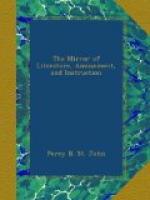[8] One of Mr. St. John’s
lines in the Essay on the Influence of
Great
Cities (the worst in the volume,) is “The very
name of
London
sounds sweetly to me.” This is not a whit
better than
the
man who thought “no garden like Covent Garden,
and no
flower
like a cauliflower.” Captain Morris’s
“sweet shady side
of
Pall Mall,” compared to these sentiments, is
a piece of
delicious
refinement.
Love of Pleasure.—The cause why men visit each other and converse, abstracting all considerations of business, seems to be simply the love of pleasure. This is the passion truly universal; this is the pivot upon which the world intellectual, as well as the world of sense, turns. Philosophers and saints feel it in their speculations and devotions, and yield to it too, in their way, as completely as the Sybaritish gourmand, whose stomach is his Baal and Ashtaroth. Nor is this at all surprising, in reality, for the gratification of this passion is happiness—a gem for which all the world search, and but few find.
Conversation.—The persons who shine most in conversation are, perhaps, those who attack established opinions and usages; for there is a kind of splendid Quixotism in standing up, even in the advocating of absurdity, against the whole world.
Love.—Do we imagine, when we open some new treatise on Love, that the author has discovered a fresh vein, and mined more deeply than all former adventurers? Not at all: we know very well that the little god has already usurped all beautiful epithets, all soft expressions, all bewitching sounds; and the utmost we expect from the skill of the writer is, that he has thrown all these together, so as to produce a new picture. Love is immortal, and does not grow wrinkled because we and our expressions fade. His heart is still as joyous and his foot as light as when he trod the green knolls of Paradise with Eve. He will be young when he sits upon the grave of the thousandth generation of our posterity, listening to the beating of his own heart, or sporting with his butterfly consort, as childishly as if he were no older than the daisy under his foot. His empire is a theme of which the tongue never grows weary, or utters all that seems to come quivering and gasping to the lips for utterance. We think, more than we ever spoke, of love; and if we have a curiosity when we first touch some erotic volume, it is to see whether the author has embodied our unutterable feelings, or divulged what we have never dared.
Wit in Season.—The jest of an ex-minister is as flavourless as a mummy; as unintelligible as its hieroglyphical epitaph. Three days after his fall, his wit, under the sponge of oblivion, has grown as much a mystery as the name of him who built the pyramid, or the taste of Lot’s wife.
Read my book.—When Hobbes was at any time at a loss for arguments to defend his unsocial principles, viva voce, he always used to say—“I have published my opinions; consult my works; and, if I am wrong, confute me publicly.” To most persons this mode of confutation was by far too operose; but they might have confoundedly puzzled the philosopher in verbal disputation.




